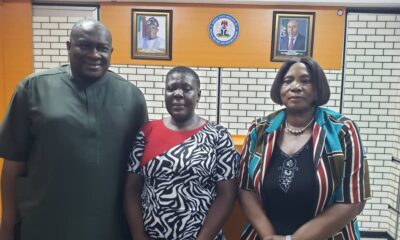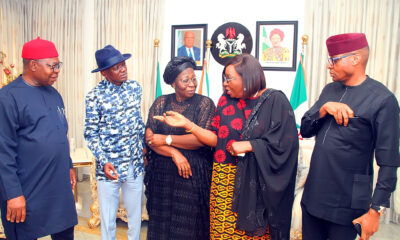Business
Generators Provide 48.6% Of Electricity In Nigeria -NBS
Generators powered by petrol, diesel and gas provide 48.6 per cent of the electricity consumed by power users across the country, according to the latest data obtained from the National Bureau of Statistics.
A document by the NBS on Power Sector Data Preview, which was presented to the Abuja Chamber of Commerce and Industry this month and obtained on Friday, showed that almost half of the country’s electricity supply was from generators.
The report further showed that the national grid was providing 51.2 per cent of the country’s power needs, indicating that many citizens in Nigeria depend on generators for electricity.
The NBS document showed that petrol-powered generators accounted for the bulk (22.6 per cent) of the electricity supplied by generators.
This was followed by diesel-powered generators, 16.6 per cent, while gas-powered generators accounted for 9.4 per cent of the self-generated electricity.
The bureau said out of 51.2 per cent of electricity provided by the country’s power grid, gas-powered plants accounted for 39.5 per cent, while hydroelectric plants were providing 11.7 per cent.
Off-grid renewables, according to the NBS, accounted for 0.1 per cent of the power consumed nationwide.
Commenting on the poor performance of the power sector despite being privatised more than eight years ago, the President, Nigerian Institution of Power Engineers, Israel Abraham, said the expectations of citizens in the privatised industry had not been met.
He disclosed this in a presentation sent to the ACCI, titled, “Nigerian power sector reform: Implementation, challenges and way forward.”
Abraham said, “In its efforts to improve the power supply situation in the country, the government opted for the reforms and eventual privatisation of the sector to attract private sector finance, technical and administrative expertise.
“However, the government and citizens’ expectations have not been fully realised many years after the exercise.”
He explained that the commercialisation and corporatisation of the sector, being the most critical stage in the reform implementation where bold and realistic decisions ought to have been taken, was skipped entirely in the implementation process.
Abraham said, “It is at this stage that private sector initiatives, such as transparency and corporate governance frameworks are introduced into the industry that will attract capital inflow to improve operational efficiencies, reducing technical and non-technical losses.
“Unfortunately, this critical stage was skipped entirely in our implementation process.”
On the way forward, the NIPE president said there was a need to strengthen institutions such as the Nigerian Electricity Regulatory Commission, System Operator and Market Operator established to drive the reform implementation process.
He said, “Unbundle the Transmission Company of Nigeria into its component units, Transmission Service Provider, Market Operator and System Operator to instil confidence in the market. Ensure full implementation of the ruling documents (Acts, Market Rules and Grid Code) to bring discipline in the market.
“Government to reduce to the barest minimum political interference in the operation of the industry regulator -NERC, for it to be truly independent and that will instil confidence in new investors.”
Business
Expert Tasks Government On Civil Maritime Security Unit
Business
Bayelsa Recommits To Infrastructure, Sectoral Dev … Rakes In N227.185b From IGR
Business
NDYC Seeks NDDC Commercialisation … Uncompleted Projects Completion
-
Business24 hours ago
NDYC Seeks NDDC Commercialisation … Uncompleted Projects Completion
-

 Rivers1 day ago
Rivers1 day agoCommissioner Promises Improved Working Conditions … Splashes N.1m On Outstanding Caregiver
-
Sports23 hours ago
Sports: 2nd Edition Of Inter-Tribal Tourney Kick-starts In Mbiama
-
Niger Delta1 day ago
NACAT Inaugurates South-South Office In A’Ibom Against Corruption
-
Sports23 hours ago
AFCON: Eguavoen, Emenike predict S’ Eagles’ chances
-
Business24 hours ago
Bayelsa Recommits To Infrastructure, Sectoral Dev … Rakes In N227.185b From IGR
-

 News1 day ago
News1 day agoS’South Deputy Govs Pay Condolence Visit To A’Ibom Colleague
-

 Niger Delta23 hours ago
Niger Delta23 hours agoHYPREP Presents Scholarship Grants To 300 Ogoni Postgraduate Students

